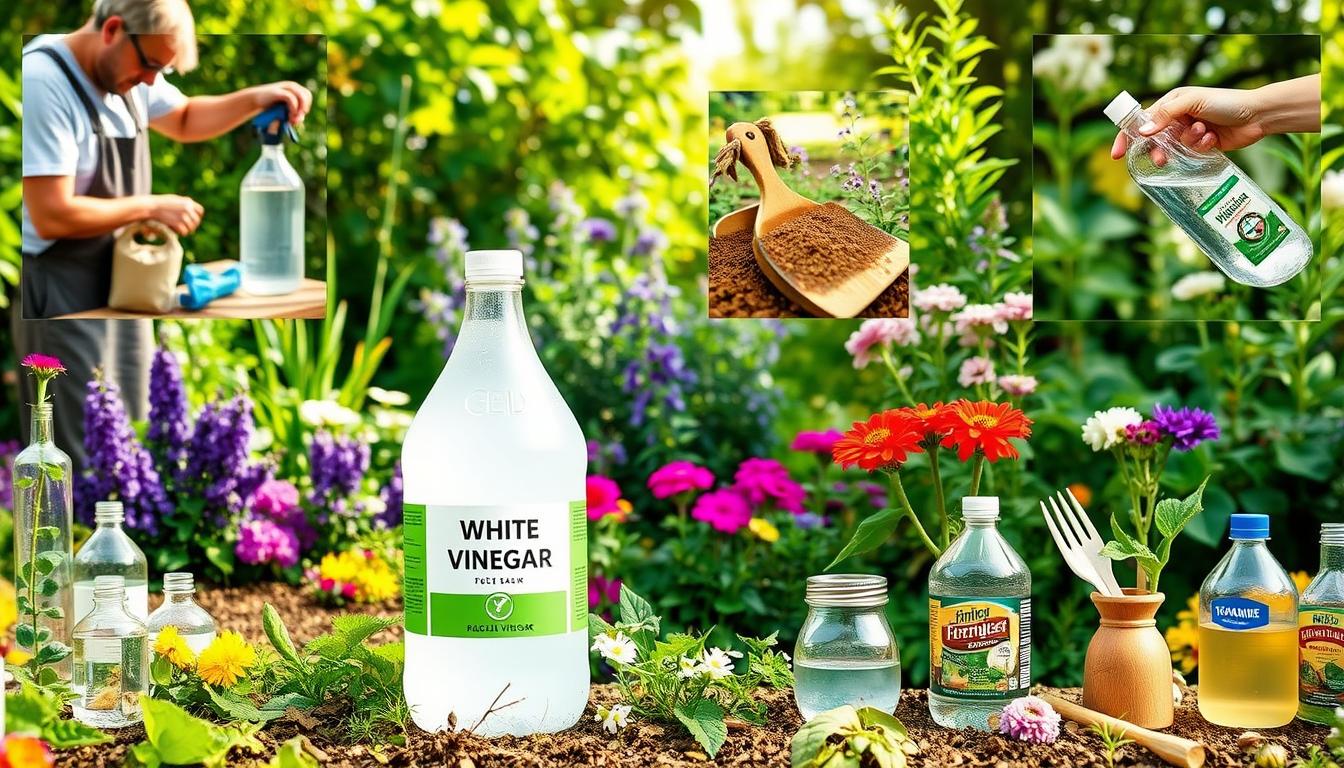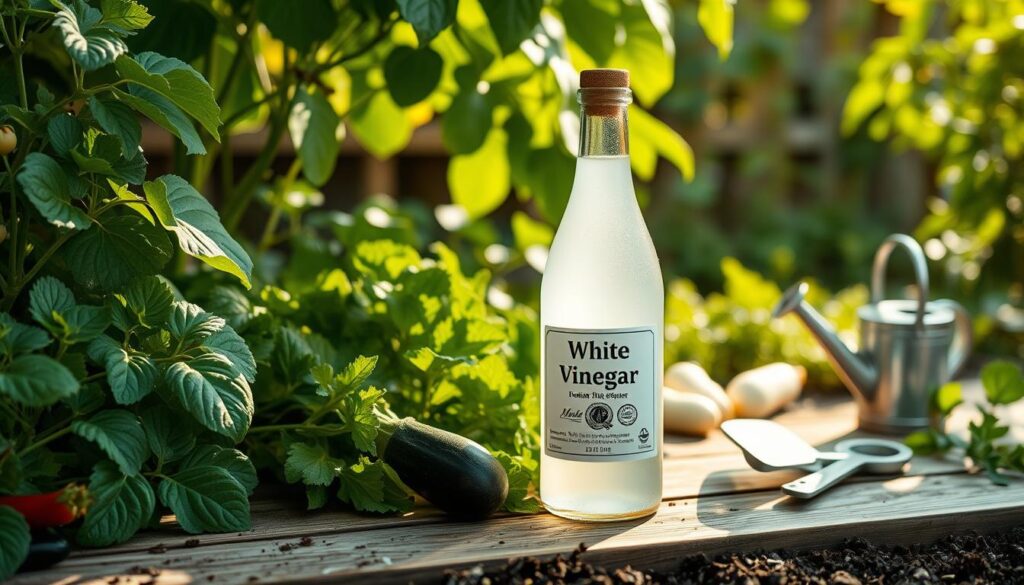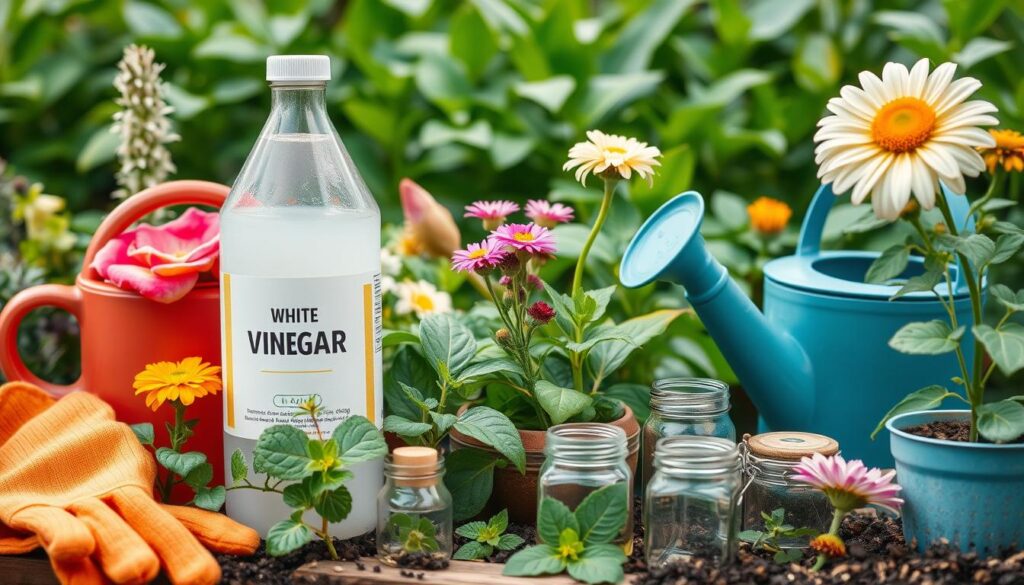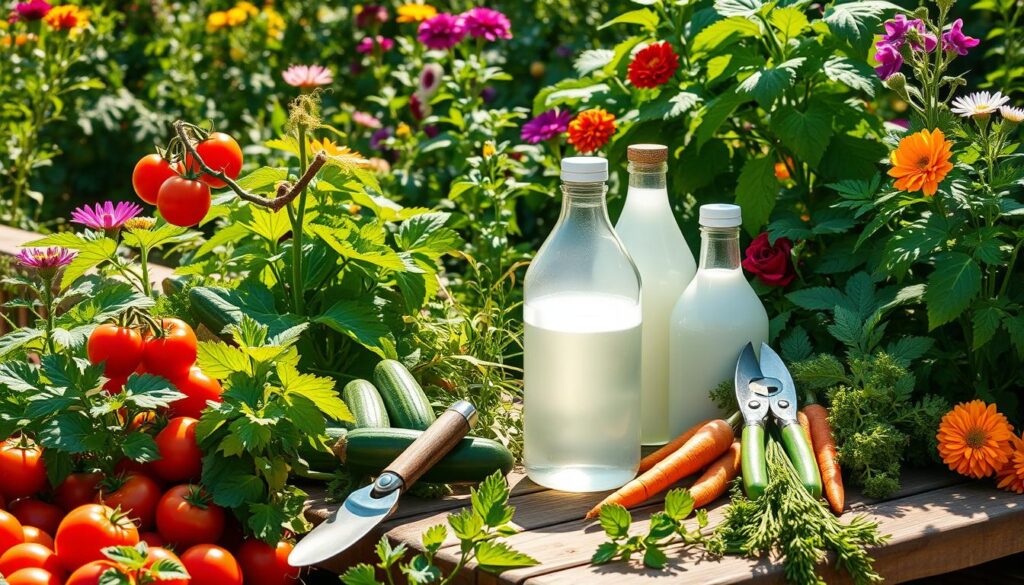
10 Practical Uses of White Vinegar in Gardening
What if a simple household item could revolutionize your gardening routine? White vinegar, a common ingredient in many kitchens, has a multitude of uses in gardening, from weed control to plant disease prevention. With its natural, non-toxic, and environmentally friendly properties, white vinegar is an attractive alternative to chemical-based products. The acidity of white vinegar makes it an effective agent for various gardening tasks, and its cost-effectiveness and safety for plants and the environment are added benefits. Exploring the various White Vinegar Uses can help you discover new ways to improve your garden’s health and productivity.
Using White Vinegar Uses in gardening can be a game-changer for many gardeners. The versatility of white vinegar is impressive, and its effectiveness in various applications makes it a valuable addition to any gardening toolkit. As we delve into the world of white vinegar in gardening, you’ll learn about the different ways to utilize this natural ingredient, from creating homemade fertilizers to preserving cut flowers. With its numerous benefits and practical applications, it’s no wonder that white vinegar has become a popular choice among gardeners looking for eco-friendly and budget-friendly solutions.
As you explore the many Uses For White Vinegar in gardening, you’ll find that this humble household item can make a significant impact on your garden’s overall health and appearance. From weed control to pest repellent properties, white vinegar is a natural and effective solution that can help you achieve your gardening goals. Whether you’re a seasoned gardener or just starting out, discovering the many uses of white vinegar can help you create a thriving and sustainable garden that you can enjoy for years to come.
Understanding White Vinegar
White vinegar, a common household item, has been gaining popularity in gardening due to its versatility and effectiveness. In Scandinavian Coastal regions, gardeners have been using white vinegar as a natural and eco-friendly alternative for various gardening tasks. To understand the benefits of white vinegar in gardening, it’s essential to know what it is and how it works.
White vinegar, also known as distilled vinegar, is a clear, colorless liquid with a sharp odor. It is made from fermented ethanol, typically from grain or sugarcane. The acidity of white vinegar, with a pH level of around 2.4, makes it useful for tasks like soil pH adjustment and weed killing. This acidity is also beneficial for White Vinegar Cleaning gardening tools and equipment.
What is White Vinegar?
White vinegar is a natural product that is free from harsh chemicals, making it an excellent choice for gardeners who prefer organic methods. Its acidity also helps to break down soil nutrients, making them more available to plants. In addition to its gardening benefits, white vinegar is also used in Scandinavian Coastal cuisine as a natural preservative and flavor enhancer.
The Science Behind Its Effectiveness
The science behind white vinegar’s effectiveness lies in its ability to lower the pH level of the soil, making it more acidic. This acidity helps to inhibit the growth of weeds and other unwanted plants. White vinegar is also a natural fungicide, making it effective against fungal diseases that can harm plants. By understanding the properties and benefits of white vinegar, gardeners can use it to create a healthier and more balanced gardening ecosystem.
- Natural and eco-friendly alternative to harsh chemicals
- Effective for weed killing and soil pH adjustment
- Natural fungicide and preservative
- Free from harsh chemicals, making it safe for plants and the environment
By incorporating white vinegar into their gardening routine, gardeners can create a more sustainable and healthy gardening ecosystem. Whether it’s used for White Vinegar Cleaning gardening tools or as a natural fungicide, white vinegar is a versatile and effective gardening solution.
Weed Control with White Vinegar
Controlling weeds is a common challenge in gardening, and using white vinegar as a natural herbicide is a effective solution to Kill Weeds. The acetic acid in vinegar disrupts the weed’s cell membranes, leading to cell death. This method is a great Garden Remedies option, as it is environmentally friendly and cost-effective.
To use vinegar for weed control, it’s essential to understand the best concentrations to use. A solution of 5-10% vinegar is typically effective, but it’s crucial to test a small area first to avoid damaging desired plants. It’s also important to note that vinegar can be harmful to skin and eyes, so proper precautions should be taken when handling it.
Here are some tips for using vinegar to Kill Weeds:
- Use a spray bottle to apply the vinegar solution directly to the weeds
- Make sure to spray the weeds on a sunny day, as the heat will help the acid penetrate the plant more effectively
- Repeat the process every few days to ensure that the weeds are fully eliminated

By using white vinegar as a natural herbicide, gardeners can create a more sustainable and eco-friendly Garden Remedies approach to weed control. This method is not only effective but also reduces the environmental impact of chemical herbicides, making it a great option for those looking for a more natural way to Kill Weeds.
| Vinegar Concentration | Effectiveness |
|---|---|
| 5% | Effective for small weeds |
| 10% | Effective for larger weeds |
Pest Repellant Properties
White vinegar is a versatile ingredient that can be used in various Vinegar Uses, including pest control in a Vegetable Garden DIY project. Its strong smell can deter insects like ants, spiders, and aphids, making it a natural and effective way to protect your garden.
To create a vinegar spray for pest control, you can mix vinegar with water and sometimes add other natural ingredients like soap or garlic. This method is safe for the environment and pets, making it a preferred choice for organic gardeners. Here are some insects that can be deterred by white vinegar:
- Aphids
- Ants
- Spiders
- Whiteflies
When using vinegar as a pest repellent, it’s essential to note that the acidity of the vinegar can be harmful to some plants. Therefore, it’s crucial to test the spray on a small area of the plant before applying it to the entire garden. By incorporating vinegar into your Vegetable Garden DIY project, you can create a natural and effective pest control system that is safe for the environment and your plants.
In addition to its pest repellant properties, white vinegar can also be used to balance the pH of the soil and act as a natural fertilizer. By exploring different Vinegar Uses in your garden, you can create a holistic and sustainable gardening system that promotes healthy plant growth and reduces the need for harsh chemicals.
Enhancing Soil Quality
Soil quality plays a vital role in plant growth, and white vinegar can be a valuable tool in enhancing it. By using white vinegar for White Vinegar Cleaning purposes, gardeners can create a more balanced environment for their plants to thrive. One of the key benefits of using vinegar in soil is its ability to adjust the pH level, making it more suitable for plant growth.
Vinegar can help balance soil pH, especially in cases where the soil is too alkaline. Although vinegar itself is not a fertilizer, it can help make fertilizers more effective by adjusting the soil’s pH to a level where nutrients are more accessible to plants. This is a great example of Vinegar Uses in gardening, showcasing its versatility and benefits.

Benefits of Vinegar in Soil
- Adjusts soil pH levels
- Makes fertilizers more effective
- Enhances nutrient accessibility for plants
By incorporating white vinegar into their gardening routine, individuals can experience the benefits of White Vinegar Cleaning and Vinegar Uses firsthand. Whether it’s adjusting soil pH or making fertilizers more effective, vinegar is a simple yet powerful tool that can take gardening to the next level.
Plant Disease Prevention
White vinegar is a versatile Garden Remedies that can be used to prevent and treat various plant diseases. Its acidity creates an environment that is not conducive to fungal growth, making it an effective natural fungicide. To use vinegar as a fungicide, mix 1 tablespoon of vinegar with 1 gallon of water and spray it on the affected plants.
Vinegar can be used to Kill Weeds and prevent fungal diseases such as powdery mildew and root rot. It is essential to note that vinegar should be used in moderation, as excessive use can harm plants. A balanced approach to using vinegar as a Garden Remedies is crucial to maintaining healthy plants.

- Cost-effective and environmentally friendly
- Easy to use and apply
- Can be used to prevent and treat a wide range of fungal diseases
In addition to using vinegar as a fungicide, it is also essential to maintain good gardening practices, such as providing adequate air circulation and removing infected plants. By combining these methods, gardeners can effectively prevent and treat plant diseases, ensuring healthy and thriving plants.
| Disease | Symptoms | Treatment |
|---|---|---|
| Powdery Mildew | White powdery patches on leaves | Vinegar spray, remove infected leaves |
| Root Rot | Soft, mushy roots, yellowing leaves | Vinegar spray, improve soil drainage |
Cleaning Gardening Tools
Cleaning gardening tools is an essential part of maintaining a healthy Vegetable Garden DIY. One of the most effective and eco-friendly ways to clean gardening tools is by using White Vinegar Uses. White vinegar is a natural disinfectant that can help kill bacteria and dissolve mineral deposits that can damage tools.
To clean gardening tools with white vinegar, you will need a few simple materials. These include:
- A bucket or container
- White vinegar
- Water
- A soft-bristled brush
Start by mixing one part white vinegar with two parts water in the bucket. Soak the gardening tools in the solution for about 30 minutes. Then, use the soft-bristled brush to scrub away any dirt or debris. Rinse the tools with clean water and let them dry.

Regularly cleaning gardening tools with white vinegar can help prevent the spread of diseases and maintain their effectiveness. By incorporating White Vinegar Uses into your Vegetable Garden DIY routine, you can keep your tools in good condition and your garden healthy.
Preserving Cut Flowers
White vinegar can be used to extend the lifespan of cut flowers. The acidity in vinegar helps to prevent bacterial growth in the water, which is a common cause of flower wilting. By adding a small amount of vinegar to the water, you can help keep your cut flowers fresh for a longer period.
One of the most effective uses for white vinegar is as a natural preservative for cut flowers. To create a vinegar-based flower preserver, you can mix 1 tablespoon of white vinegar with 1 tablespoon of sugar and 1 quart of water. This solution helps to feed the flowers and prevent bacterial growth, keeping them fresh and healthy.
Benefits of Vinegar in Flower Preservation
- Prevents bacterial growth in the water
- Helps to feed the flowers
- Extends the lifespan of cut flowers
In addition to its preservative properties, vinegar cleaning can also be used to clean vases and other flower arrangements. By mixing equal parts water and white vinegar, you can create a solution that effectively removes dirt and bacteria from surfaces.
Creating a Vinegar Flower Preserver
To create a vinegar flower preserver, you will need the following ingredients:
| Ingredient | Quantity |
|---|---|
| White vinegar | 1 tablespoon |
| Sugar | 1 tablespoon |
| Water | 1 quart |
By following these simple steps and using uses for white vinegar and vinegar cleaning techniques, you can help keep your cut flowers fresh and healthy for a longer period.
Boosting Seed Germination
Soaking seeds in a solution before planting is a common practice to enhance germination rates. For gardeners in Scandinavian Coastal regions, using a vinegar solution can be particularly beneficial. The acidity in vinegar helps to break down the seed coat, making it easier for the seedling to emerge. This method is a simple yet effective Garden Remedies technique to improve seed germination.
By soaking seeds in a vinegar solution, gardeners can increase the chances of successful germination. The benefits of this method include improved seed coat breakdown, enhanced seedling emergence, and increased seed vigor. For gardeners looking to try this method, it’s essential to note that not all seeds respond equally well to vinegar soaking. Some seeds, such as those from the Brassica family, may require a more delicate approach.
The Benefits of Soaking Seeds in Vinegar
Soaking seeds in vinegar can be particularly beneficial for seeds that have a hard or thick seed coat. The acidity in the vinegar helps to break down the seed coat, allowing the seedling to emerge more easily. This method can be especially useful for gardeners in Scandinavian Coastal regions, where the cool and wet climate can make seed germination more challenging.
Ideal Seeds to Try This Method On
Some seeds that may benefit from vinegar soaking include:
- Cabbage seeds
- Broccoli seeds
- Cauliflower seeds
These seeds have a relatively hard seed coat and can benefit from the acidity in the vinegar solution. By soaking these seeds in a vinegar solution, gardeners can improve seed germination rates and increase the chances of successful seedling emergence.
Removing Slime from Garden Surfaces
Garden surfaces can become slippery and unsightly due to the growth of slime mold. One effective way to remove this mold is by using White Vinegar Uses, which can help Kill Weeds and other unwanted growth. The acidity in white vinegar disrupts the cell structure of the mold, making it easy to remove.
To tackle slime mold with vinegar, mix a solution of equal parts water and white vinegar in a spray bottle. Spray the solution onto the affected area, making sure to saturate the mold completely. Let it sit for about 10-15 minutes to allow the acidity to penetrate the mold. Then, use a brush or scrubber to remove the mold, and rinse the area with clean water.
Some effective application techniques include:
- Applying the vinegar solution in the morning, allowing the sun to help dry out the area
- Using a soft-bristled brush to gently scrub away the mold, avoiding damage to the surface
- Rinsing the area thoroughly to remove any remaining vinegar and mold residue
By following these steps and using White Vinegar Uses to Kill Weeds and remove slime mold, you can keep your garden surfaces clean and safe. Remember to always test a small area before applying the vinegar solution to ensure it doesn’t damage the surface.
| Surface Type | Vinegar Solution Dilution |
|---|---|
| Concrete | 1:1 (equal parts water and vinegar) |
| Wood | 2:1 (two parts water to one part vinegar) |
| Stone | 3:1 (three parts water to one part vinegar) |
Creating Homemade Fertilizers
For a thriving Vegetable Garden DIY, it’s essential to provide your plants with the necessary nutrients. While vinegar itself is not a fertilizer, it can be combined with other natural ingredients to create effective homemade fertilizers. The acidity in vinegar helps solubilize minerals, making them more available to plants.
One of the most popular Vinegar Uses in gardening is to create a natural fertilizer. By combining vinegar with other ingredients like compost tea, manure, or Epsom salt, you can create a nutrient-rich fertilizer for your plants. Here are some recipes you can try:
- Compost tea with vinegar: Mix 1 cup of compost tea with 1 tablespoon of vinegar and water it down to a 1:10 ratio.
- Manure and vinegar fertilizer: Combine 2 cups of manure with 1 cup of water and 1 tablespoon of vinegar.
- Epsom salt and vinegar spray: Mix 1 tablespoon of Epsom salt with 1 gallon of water and 1 tablespoon of vinegar.
These homemade fertilizers can be applied directly to the soil or used as a foliar spray. Remember to always dilute the vinegar with water, as undiluted vinegar can be harmful to plants. With these simple recipes, you can create effective fertilizers for your Vegetable Garden DIY using Vinegar Uses.
Conclusion: The Versatility of White Vinegar
As we’ve explored, white vinegar is a true gardener’s ally, offering a versatile and natural solution to a wide range of gardening challenges. From its ability to effectively control weeds and deter pests to its power in enhancing soil quality and preventing plant diseases, this humble kitchen staple is a must-have in any sustainable gardener’s toolkit.
Recap of Benefits in Gardening
Whether you’re looking to create a lush, thriving garden or maintain the health and appearance of your outdoor spaces, white vinegar can be your secret weapon. Its ability to balance soil pH, act as a natural fungicide, and even boost seed germination makes it an invaluable resource for gardeners seeking eco-friendly alternatives to harsh chemicals.
Encouragement to Try These Uses
Given the myriad of practical uses for white vinegar in gardening, we encourage you to experiment with this versatile solution and see the transformative effects it can have on your outdoor space. From tackling weeds to preserving cut flowers, the applications are endless, and the rewards are well worth the effort.
Leave a Reply